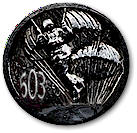John
Lindgren and I were at the Boston reunion, July, 1989 and we were talking
to Bill Rose, our regimental special services officer at that time. We
brought up the show he put on at Hollandia under the coconut trees at Ebli’s plantation.
"Even to this day I feel a sense of disappointment
when I remember that show," he told us. "Colonel Charles
Lindberg was at Hollandia at the time of the show, and I felt sure that if
I had asked the colonel, he would have come to our show and spoken to
us. I didn't get around to doing this and felt that I missed
the chance to put on a good show. I feel sure we would have
enjoyed seeing and hearing Colonel Lindberg that night. We
probably would have behaved better."
(Lindberg had been an Army Air
Corps Colonel, but President Roosevelt had refused to reinstate
Lindberg's commission which Lindberg had resigned in 1939 so as to
pursue his anti-war America First agenda. Nonetheless, Lindberg's
fame was not tarnished amongst the troops, and he was widely regarded
throughout the theater. Lindberg flew missions ostensibly as a civilian
consultant, an extraordinary recognition by the men that what the brass
in Washington didn't know wouldn't hurt them.)
No one
looked forward to the return to the daily grind of training. The monotony
hour after hour. You trained and trained, then the job you had trained
for seemed near at hand, but it was cancelled and back to the jungles. To
be honest, though, although the platoon leaders hated the training routine
as much as anyone, once in combat I doubt that there was any platoon
leader that did not feel at times that he wished there had been more
training. You look around and see men bunching up or failing to take
other normal safety precautions, you felt like we need more training.
Then too deep down we knew everyone did not know all the basics."
For example,
time and time again we went through the principles of map reading. Soon
after we started this series of training, the 1st platoon assistant
platoon leader, Emory Ball, was giving a map reading class. He picked out
one of the men, who later transferred to another company, and told him to
demonstrate a method of orienting a map. He handed him a map and a
lensatic compass. The man was at a complete loss. The bad was that
Colonel Jones and Lt. McRoberts had just walked up. To say they were
unhappy is a gross understatement. This man was one of the chief bitchers
when the map reading class was announced. He could not see why we had to
keep taking that old map reading over and over again. I doubt very
seriously if we ever over-trained, even if we thought we did.
At this time we
were beginning to get news from Europe, and the big news was the invasion
of France proceeded by the great airborne landings. This probably added
to our woes since our brother units in Europe were all seeing great action
and we were training again. This was not a command failure. There were
just no suitable operations requiring the use of parachute troops in the
Pacific.
We were losing a
few men at this time or had lost them since Australia. They had been with
the outfit for some time. George Barnes was the 1st platoon sergeant. He
had been a squad leader at the time of the Nadzab jump. He seems to have
gone while we were at Dobodura. Some of the officers were going, too. At
this time people seemed to just disappear.
There were
probably more rumors flying around here than at any other place we were
ever in. Heavy fighting was taking place on Biak and many rumors
concerned this action. Then there were many rumors concerning Jap
counterattacks. At this stage we did not know how much damage had been
suffered by the Japs. Rabaul was still considered as a great Japanese
stronghold, and the Japs were expected to sally forth at anytime.
In reading back it
seems that victory was assured by this time, but to us the issue was still
in doubt. In looking ahead toward Japan we had a lot of territory to
capture. Then even the Philippine Islands seemed far away. Never was
there any doubt in our minds that the Japs would not fight to the bitter
end defending every inch of their homeland. This was a logical opinion,
because then Jap soldiers were so fanatical in their warfare that very few
ever surrendered. In our minds we could not see an end, just a war that
would go on for years and years.

![]()

![]()
![]()


![]()
![]()
![]()
![]()
